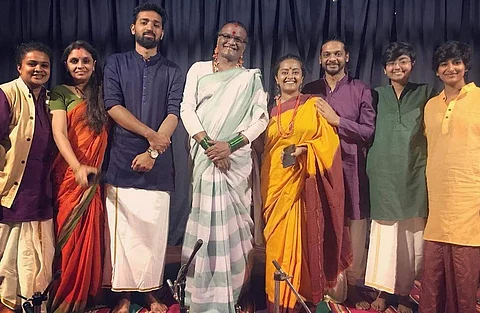

When Manjamma Jogathi was disowned by her family for being transgender, never in her wildest dreams did she think that her life would become an example for others in her community. She has come a long way in creating a niche for herself in the folk art of Janapada music in Karnataka. In fact, she was appointed as Chairman of the Karnataka Janapada Academy last year for her contribution towards Janapada music. Now, her journey will be turned into a book titled Naduve Suliva Hennu by Arun Jolada Kudligi. Manjamma says, "This book is not just about the life of a transgender but it talks a lot about Jogathi Nritya (dance) and songs that I have been performing for more than two decades across the state. It is going to be a unique book in Kannada Literature for future generations to read."
Like every other transgender, Manjamma too moved from one city to the other doing menial jobs for a living, although she never involved herself in sex work. Sometimes, she would sell three to four kgs of idli to make a living. For a few years, she even took tuitions for students of class 5, 6 and 7 and earned a small amount through which she could manage her expenses. But her life as a jogathi was mostly dedicated to music and dance. She explains, "I was given Jogathi Deeksha (initiation) when I was young in Huligemma's temple near Hospet. Coming from an Adivasi family, we worshipped female deities and one of them was Saundatti Yellamma. Jogathis are those who worship and follow Yellamma and dedicate their lives to spreading the word about this female deity through music and dance. In the phase of migrating from one city to another, I met Mattikal Basappa and Kalavva Jogathi who have contributed a lot towards folk art. The duo became my first gurus and staying with them, I learnt to sing Janapada songs and dance according to the beats."
So what exactly are these Janapada songs? They are songs that tell stories of people in simple Kannada. Manjamma learnt and excelled in singing these songs, telling stories of female deities. It includes Yellammanatta, Padlige and Chowdki. "Whenever we perform Yellammanatta, I play the role of a female deity, Renuka who is killed by her son for a mere misunderstanding. I explain the sorrow of Renuka through my songs and the audience gets connected to it easily. Not just singing songs, we use various traditional instruments when we perform Yellammanatta. Apart from this, I have played several roles in mythological plays. But my intention has always been to popularise the Jogathi Nritya, Janapada songs and Yellammanatta. I have performed these over 1,000 times. The stories of female deities reflect on issues of feminism, patriarchy, gender roles and others, thus making it relevant forever."
Recognising her efforts towards the art, the Karnataka government in 2006 felicitated Manjamma with the Karnataka Janapada Academy Award, Karnataka Rajyotsava Award in 2010 and several other awards and felicitations followed. This is not the first time that a book is going to be published on the life of Manjamma. Earlier, an eponymous book was published in Kannada in 2014, which is a part of the curriculum for degree students at the Karnataka State Akkamahadevi Women's University in Vijayapura. A few months later, Manjamma's life story was published in a Telugu magazine called Amma Nudi in Andhra Pradesh.
How has life been after becoming the Chairman of the Karnataka Janapada Academy? To this, the 63-year-old folk artist, says, "Life has not been any different to me after becoming Chairman. I am still the same person who lives and breathes song and dance. But now, I also want to take folk art across the length and breadth of this country. However, within two months of my appointment, the lockdown was announced due to the pandemic. Despite this, when schools were open, I went personally to conduct summer camps for school kids and create awareness about folk art. These plans of conducting camps to train children in the art of Janapada are still on my list and I hope to implement them in the future."
